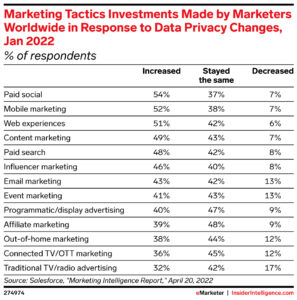
In a recent survey, 91% of leaders reported that their marketing team was successful last year after adjusting their budget and efforts to adapt to the needs and preferences of consumers after COVID-19. Now, there’s a new challenge for marketers: Data privacy regulations. Recent and upcoming changes to everything from Google’s third-party cookie tracking and government regulations to Apple iOS 15 and app tracking data are creating obstacles for even the most experienced marketers. Factor in the effects of countless data breaches leading to consumer distrust and marketers have their work cut out for them.
Adapting to data privacy changes
So, how can marketers adapt to data and privacy changes while earning consumers’ trust? Research shows marketers are already making changes by increasing their budgets in things like paid social and mobile marketing, according to Insider Intelligence.

Here’s a closer look at the strategies that marketers are investing more in due to privacy changes:
Invest in paid social
Of all the investments marketers are increasing in response to data privacy changes, paid social tops the list. In January 2022, 54% of marketers surveyed said they’d be dedicating more of the budget to advertising on social media.
With Apple’s new privacy updates allowing consumers to opt-out of being tracked and the gradual phasing out of third-party cookies, paid social offers two advantages. First, marketers can diversify their portfolio of platforms. Second, integrating owned data — such as that stored in MailChimp or another CRM system — can help marketers home in on their target audience.
Broaden mobile marketing
Like paid social, half of the marketers surveyed said they’ve increased their investment in mobile marketing.
While Google’s new privacy policy limits the data shared on Android devices, the bigger hit to marketers comes from Apple.
The company’s App Track Transparency system requires users to opt-in every time they use an app to be tracked by advertisers. The move is meant to prevent invasive advertising and boost transparency, making targeted advertising much more difficult.
Brands will still be able to reach users who opt out of targeted ads, but the focus will shift to brand awareness, group interests and demographics. The trick will be testing out more general direct response campaigns on social media first.
Improve web experiences
With data privacy changes affecting brands’ ability to track, analyze and market to potential customers, it pays to invest in the experiences of users who find brands on their own.
Multiple touchpoints in the customer journey force marketers to improve online interactions to ensure users find the experiences easy, fast and beneficial.
Marketers have to think like their customers to streamline and upgrade the most vital actions on an e-commerce site or website that can lead to a sale, including:
- Searching for information.
- Decision-making.
- Customer service.
- Comparison shopping.
- Using the product.
- Purchasing, shipping and returns.
Because data privacy changes may make it harder to grab or keep the attention of potential customers, the last thing marketers want to do is lose them once they do come to your site.
Expand content marketing
Google loves content but now more than ever, marketers need to focus on quality over quantity. Largely unaffected by the new data and privacy changes, content marketing is a cost-effective means for marketers to boost brand awareness, build authority, enhance traffic and conversions, and grow their search engine optimization without leveraging consumers’ data.
Although producing content requires creativity, talent and resources, it’s still one of the most cost-effective ways to control the conversation and help put multiple aspects of sales on autopilot. From video tutorials and podcasts to newsletters and blogs, entertaining and informative content is worth the investment.
Need some help creating content? ContentMarketing.com can help.
Capitalize on paid search
Paid search will also get more attention from marketers, with nearly half of those surveyed saying they plan to increase their budget in response to data privacy changes.
Investing in paid search marketing helps brands increase their visibility to highly interested prospects who are already looking for products, services or solutions to a problem. In addition to increasing traffic to an e-commerce site, blog or website, marketers can also get detailed analytics from the campaigns.
Explore influencer marketing
Viewed among the most trusted of sources, influencers often produce original content at a relatively affordable rate. Additionally, influencer marketing campaigns can significantly increase brand awareness, followers (for the brand and the influencer), and trust.
Other than FTC guidelines regarding transparency, influencer marketing provides fewer obstacles than more traditional marketing in terms of the risks and limitations posed by data privacy changes. If you’re considering influencer marketing, now is the time to try it.
Update analytics
With Mail Privacy Protection making it harder to track things like IP addresses and email opens in Apple Mail, which accounts for 49.8% of combined email opens, analytics had to change.
Metrics are shifting away from open rates to click-through rates and other actions taken after the email was opened. Brands are turning to other KPIs through programs like Google Analytics.
As data privacy changes make some old metrics obsolete or harder to obtain, now is the time to invest in updated analytics that will help marketers learn from campaigns, adapt accordingly and grow business.
Follow the lead of marketers who are adapting to data privacy changes by implementing these tactics. Consider the challenges posed by the changes as opportunities, rather than roadblocks, and get your team on board to assess your options.